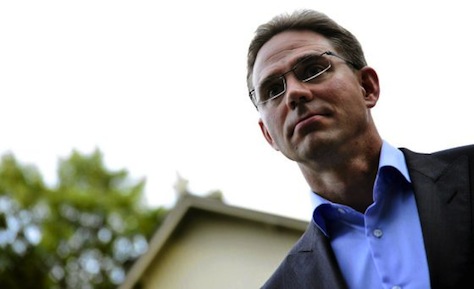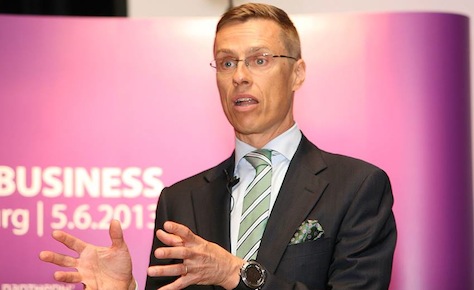Just three years after taking power as Finland’s prime minister, Jykri Katainen is set to step down both as leader of Finland’s center-right Kansallinen Kokoomus (National Coalition Party) and as prime minister later this month, following the Saturday leadership election of Alexander Stubb as the party’s new leader. ![]()
Though Katainen (pictured above) is just 42 years old, he’s been at the helm of the National Coalition Party for a decade. Katainen stunned Finland in April when he announced he was resigning, with an eye toward pursuing a top job in the European Union. At the time, everyone assumed he was angling to become Finland’s next commissioner within the European Union, replacing Olli Rehn, the influential vice president of the Commission and, since 2010, the commissioner for economic and monetary affairs.
Rehn previously served from 2004 to 2010 as commissioner for enlargement, and he was recently elected to the European Parliament as a member of Finland’s liberal Suomen Keskusta (Centre Party).
But as the wrangling continues among Europe’s leaders over whether former Luxembourgish prime minister Jean-Claude Juncker should become the next president of the Commission, Katainen has tried to position himself as an attractive alternative.
* * * * *
RELATED: The mother-of-all-battles over European integration has begun
* * * * *
Juncker seems likely to command an absolute majority of the European Parliament, but there’s no sure bet that he’ll win the qualified majority within the European Council that he’ll need to win the Commission presidency. Juncker, led the pan-European campaign of the European People’s Party (EPP) in the May parliamentary elections, which won the largest number of seats in the 751-member legislature.
Enter Katainen, who’s guided a tenuous six-party (now five-party) coalition in Finland for the past three years, pushing through tough budget cuts, like so many other European governments over the last half-decade, in the face of economic recession. Before his National Coalition Party won the April 2011 national elections, Katainen previously served as finance minister and deputy prime minister, so he would bring to the job — or to any other top EU position — the experiences from governing through the eurozone sovereign debt crisis.
Even if Juncker doesn’t make it, Katainen has competition. Christine Lagarde, the former French finance minister and managing director of the International Monetary Fund, is often mentioned as a dream candidate, but she has already ruled out a move to Brussels. British prime minister David Cameron, who openly clashed with German chancellor Angela Merkel over Juncker’s candidacy last week, has indicated his support for social democratic Danish prime minister Helle Thorning-Schmidt, though she might try to win a second term in government after Danish elections next year.
Unlike Lagarde and Thorning-Schmidt — or other potential center-right candidates like Irish taoiseach Enda Kenny, Polish prime minister Donald Tusk and Lithuanian president Dalia Grybauskaitė — Katainen is almost certainly headed to Brussels, no matter what happens.
Katainen, as Commission president, or as president of the European Council or as the EU’s high representative for foreign affairs, would bring the perspective of a new generation of leadership to the EU institutions. Juncker, at age 59, served as Luxembourg’s prime minister from 1995 until December of last year, and he first served as finance minister in 1989. Herman Van Rompuy, who will step down as Council president in November, is 66 years old, and first served as a major minister in the Belgian government in 1993.
Katainen, who speaks fluent English (if shaky French), would add some geographical diversity as well. Remarkably, while Juncker would be the third Luxembourger to serve as Commission president, Katainen would be the first Commission president from outside western Europe and only the third permanent Commission president who hails from a country outside the original six founding members of the European Economic Community. As a Finnish Commission president (or Council president or high representative), he would bring the geopolitical sensitivity, shared by Poland and the Baltic states, of a country neighboring a newly aggressive Russia.
Ideologically, Katainen is relatively moderate. Under his leadership, he pulled the center-right National Coalition Party in a more socially liberal direction, especially on social issues, broadening the party’s appeal beyond wealthy urbanites in much the same way that Norway’s prime minister Erna Solberg led her own Høyre (Conservative Party) to government last September. As prime minister, however, his chief ally has been the center-left center-left Suomen Sosialidemokraattinen Puolue (SDP, Social Democratic Party), demonstrating that like Merkel and other center-right European officials who lead ‘grand coalitions,’ Katainen can easily work across the ideological divide.
Back in Finland, the National Coalition Party elected Stubb, the minister for foreign trade and European affairs, and formerly, foreign minister, as its new leader.
That means that Stubb (pictured above), a trim 46-year-old Helsinki native with a penchant for triathlons, will shortly become prime minister and lead his party into elections expected in April 2015 — a race that’s shaping up as a three-way fight among the National Coalition Party, the Centre Party and the right-wing, nationalist Perussuomalaiset (PS, Finns Party). Stubb will be the first member of the Swedish-speaking minority to serve as prime minister since the 1950s.
In the meanwhile, Stubb will inherit a coalition that’s struggling under the weight of three years of unpopular budget-cutting and two years of zero economic growth. No one has taken the brunt of those decisions more than the Social Democrats, which recently dumped their leader, Jutta Urpilainen, in favor of Antti Rinne, a trade unionist who is expected to take a stronger anti-austerity line after winning the SDP leadership race last month. Rinne replaced Urpilainen as Finland’s finance minister only 10 days ago.
The SDP, which currently holds 42 seats (two less than the National Coalition Party’s 44) in the 200-member Eduskunta, Finland’s unicameral parliament, has fallen into fourth place, according to polls.
In order to govern, Stubb will have to reach an understanding with Rinne, and he’ll also have to reassure three other minor allies like the Vihreä liitto (Green League), which opposes the government’s support for nuclear energy, the Suomen ruotsalainen kansanpuolue (RKP / SFP, Swedish People’s Party of Finland) and the Kristillisdemokraatit (Christian Democrats). A sixth coalition partner, Vasemmistoliitto (Left Alliance) quit the government in March after the last budget negotiations. Stubb campaigned for the party leadership on a pledge of introducing stimulative tax cuts.
Stubb is an unabashed proponent of joining NATO — a controversial step for a country that’s assumed the mantle of neutrality since the Cold War.
Photo credit to Trond H. Trosdahl / Lehtikuva.

